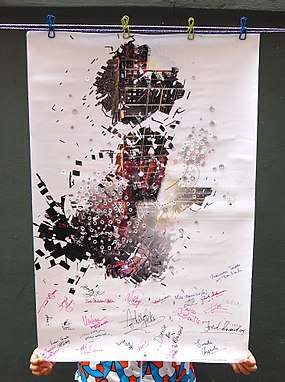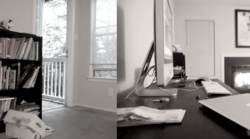Philosophers Legacy (Heirloom)
The Philosophers Legacy, also known as the phylosophers legacy, is an heirloom and charity work in the form of a digital painting created by Ade Olufeko, a designer known for his multidisciplinary work on African social economics. The original artwork was created in 2013. It underwent enhancements in Lagos and was reissued in 2017 as a major collaboration project piece through Oxford University's OAC.[1] According to the Vanguard news, parts of the art piece's collaboration effort were influenced by 1985's We Are the World music project. Observations by legal experts suggest that the eventual buyer of the artwork's reissue cannot financially exploit the heirloom until the year 2033, stating that all "proceeds at any time from sales will remain within the African economic system".[2]
| Philosophers Legacy | |
|---|---|
| What Ever Is Destroyed Is Created Again | |
 Heirloom painting of the Legacy 2017 | |
| Artist | Ade Olufeko |
| Year | 2013-2017 |
| Medium | Mixed media painting Giclée |
| Movement | African Renaissance Avant-garde |
| Subject | Interdependence and emerging economies |
| Dimensions | 60 cm × 91 cm (24 in × 36 in) |
| Designation | Berne Convention - for the Protection of Literary and Artistic Works |
| Location | Lagos |
Background

In the spring of 2013, Olufeko known for his cross-disciplinary signature through technology, created the artwork on the premise of Social inclusion, brain gain and innovation. The art piece originally titled, Whatever is destroyed is created again, was made for and leveraged by an NGO, the United for Kids Foundation in Washington D.C.[3]
Revealed for the first time at the Whittemore House making its debut to the public, it successfully raised money for children, and all proceeds were used to build libraries and classrooms in Lagos, Nigeria.[3] The artwork surfaced at another fundraiser at the Civic Center in Lagos, drawing affluent patrons of the arts, doubling donations of its previous auction.
The conception of the finished piece is suggested to be a blueprint or predictive analysis of the continent's economic growth. As an inspiration of African incremental progress, its projections are aligned and is said to surpass some projections of the African Union (AU).[2]
Design
The Non-traditional artwork is described as a visual albedo, it incorporates and is classified as; mixed media, digital abstracts and painted work. Portions of the piece were created via a graphics tablet on an iMac, and printed to heavy coated paper. It is sprinkled with crushed amethyst clusters, acrylic diamond confetti and inscribed with permanent markers. The year 2053 appears in the center of the work allowing interpretations of trajectories to theorists. As part of the reissue, signatures and enhanced artistic deformations were added for Art valuation.[2]
Reissue and Sungbo's Eredo
In spring 2017, Olufeko attended and spoke at the Blavatnik School of Government's Breaking the Frame[works] conference alongside other thought leaders, discussing the "changing state of the African continent", on the topics of media, technology and governance.[1] Prior to the conference, Olufeko collaborated with the conference team at Oxford to reissue the painting, "Philosophers’ Legacy ". The new version and charity experiment was created in stealth mode. The piece was completed in October 2017, making its debut inside Sungbo's Eredo, an African monument. The release coincided with the 10th anniversary marking of Visual Collaborative.
Reception
According to Road to Africa, the artwork's place in the Fourth Industrial Revolution can be leveraged to aid ongoing brain-gain initiatives to steer NGOs, the private sector and friends of the continent which includes its diasporas into a self-reliant, yet an interdependent partner of the world economy.[4]
Signatures
The following is a list of persons at and outside the oxford conference who signed the artwork.[2]
- Mike Adenuga Jr. GCON, CSG, CLH – business magnate
- Donald Kaberuka – economist
- Fred Swaniker – entrepreneur
- Seko Shamte – Tanzanian filmmaker
- Tokunbo Talabi – businessman
- Jake Okechukwu Effoduh – activist and lawyer
- Eryca Freemantle – global beauty ambassador
- Abiola O. – New York City publisher
- Banky W – Nigerian singer and media mogul
- Vivian Ojo – OAC conference chair
- Angel Jones – brain gain advocate
- François-Xavier Ada – researcher
- Ademola Adesina – renewable energy investor
- Joseph Hundah – media executive
- Nawal M. Nour – African women's health practitioner
- Simukai Chigudu – a medical doctor
- Dumile Dlamini – fashion director
- Vimbai Gwata – technologist
- Kevin Marsh – Oxford professor
- Princess Ashilokun – poet
- Dr. Yene Assegid – leadership coach
- Gareth Ackerman – businessman
- Leona Hauldren – British preschooler
References
- Ibiwoye Dotun. "African leaders endorse Philosophers'Legacy". Vanguard Nigeria. Retrieved Dec 8, 2017.
- "Leaders endorse "Phylosophers' Legacy", a monumental piece created by Ade Olufeko". Talk Media Africa. Retrieved Dec 9, 2017.
- "United for Kids Foundation (UKF) Ambassadors Ball". MP Master Plan events. December 18, 2011. Archived from the original on March 3, 2012. Retrieved December 9, 2017.
- Michael, Olamide. "M A Jr, endorse 'Philosophers' Legacy'" (Business, Economic News, News, West Africa). Road To Africa. Retrieved 25 May 2018.